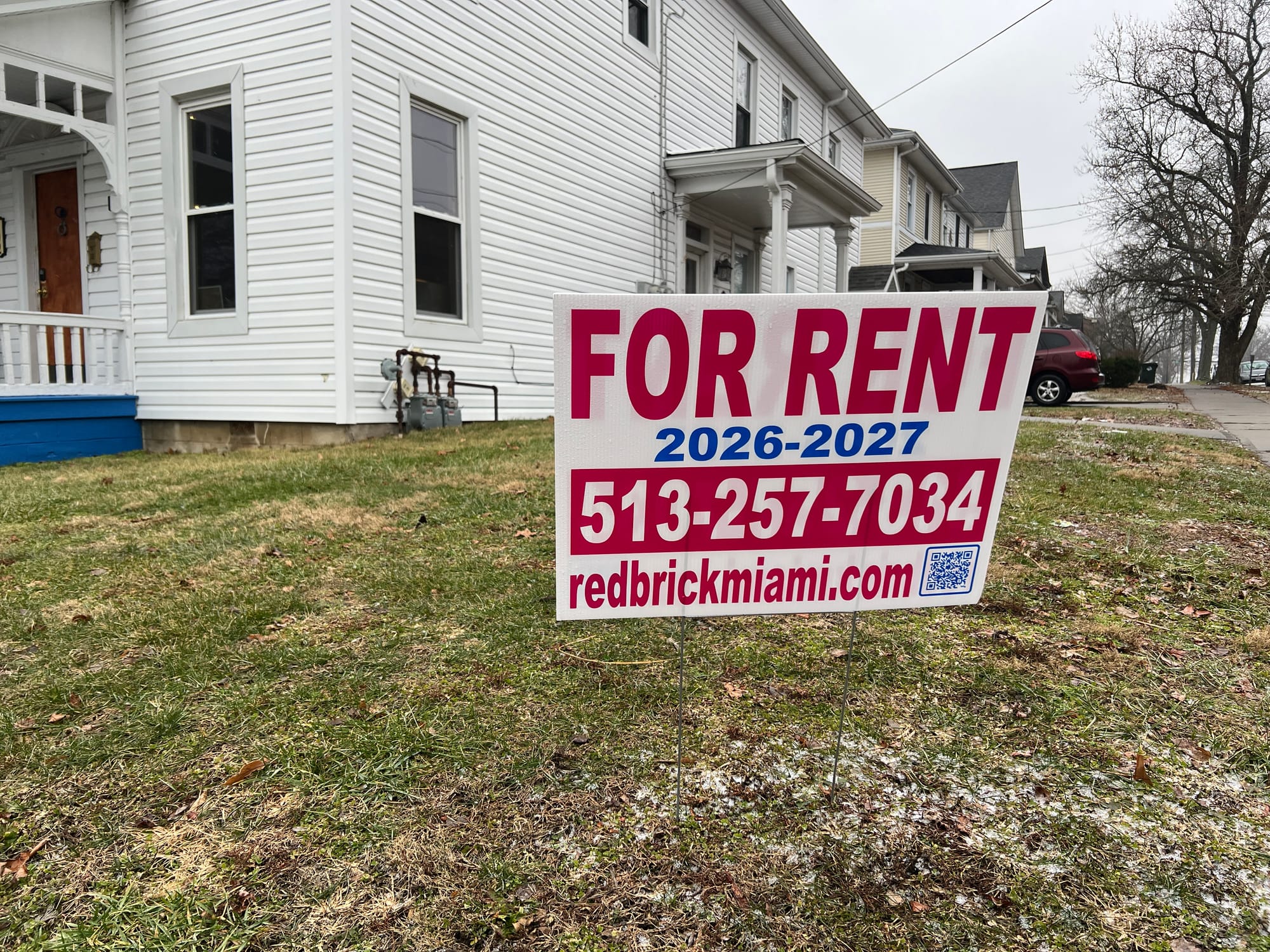Students at two off-campus rental complexes are facing eviction proceedings this semester. Miami University's Student Success Center offers services to help students facing challenges but rarely hears from students who have been evicted.
At least nine Miami University students living off campus started the new semester with eviction summonses, court records show.
SSC Oxford Apartments LLC, the company which owns the student rentals at The Annex, filed complaints against five tenants on Jan. 27. Four of those tenants are listed as students in Miami University’s online directory. The complaints against each tenant, none of whom lived in the same units, state that they hadn’t paid rent starting on Dec. 1 and that their tenancies had expired Jan. 13.
PEP-Oxford OH LLC, the company which owns the Level 27 rentals north of The Annex, filed complaints against eight tenants on Jan. 27. Five of the tenants are listed as students in Miami’s directory, and none lived in the same units as each other.
The claims filed by Level 27 state that each tenant “entered into a written lease agreement” with the company. The 30 day notices to vacate sent to tenants in December, however, stated two grounds for eviction: First, “No written lease has been signed,” and second, “Failure to pay full rent.”
All tenants facing eviction at both The Annex and Level 27 are scheduled for hearings on Feb. 19. Having a complaint filed does not guarantee that a tenant will have to move out in all cases, though.
Property managers for Level 27 did not respond to requests for comment.
Jenna Tribbett, assistant general manager for The Annex, said the complex sees a fluctuation in evictions each year. Student tenants, many of them first-time renters, may struggle to pay rent due to financial difficulties or delays in financial aid and loans. The Annex has a large international student population, as well, which Tribbett said can sometimes delay payments during winter break. Tenants are generally able to work out those issues after returning, she said.
“We do try to work with our residents as much as we can … but really it just depends on resident communication with us,” Tribbett said.
Even after filing an eviction, Tribbett said they will accept rent payments to avoid going forward with the eviction up to the court date. In other cases, tenants will move out prior to the eviction process playing out. According to a tenants’ guide to eviction court by the Legal Aid Society of Greater Cincinnati, property managers must prove in court that they accepted no rent after serving the first eviction notice, but only if the tenants go to the court date.
January was the most common month for evictions at both Level 27 and The Annex last year. According to court records, 13 of the 27 eviction proceedings with court dates at Level 27 were initiated in January, and six of the 15 Annex tenants who faced court proceedings began the process in January.
Nine of the 13 January cases at Level 27 ultimately resulted in orders to vacate. In all 13 cases, the property management company either dismissed the filings to collect unpaid rent or reached out-of-court settlements with the tenants. At The Annex, four of the six January cases were dismissed by the property management company at or prior to the first hearing, while two tenants were ordered to vacate. In both cases where the tenants were ordered to vacate, the parties agreed to out-of-court settlements to handle unpaid rent after the tenants moved out.
“We do understand they’re first-time renters and everything like that,” Tribbett said. “We do want to work with them to the best of our abilities, especially through a legal standpoint and the contracts they’ve signed.”
Craig Bennett, senior director of Miami’s Student Success Center (SSC), said the center exists to help students facing external challenges to getting their education. Those services include an emergency housing program for actively enrolled students, but he said that service has primarily been used in situations where off-campus students face safety concerns, not evictions.
When students do come to the SSC with issues related to paying bills, Bennett said his staff looks for as many solutions as possible, including grant funding, leveraging FAFSA rules and more. Ultimately, though, cost may be an insurmountable barrier for some students.
“We do everything we can to keep the student engaged at Miami, but families also have to make a decision,” Bennett said. “Is this a school that they can afford to attend? Sometimes in cases, they may have to leave for a semester, or maybe transferring is a better option for them.”

Miami has the most expensive in-state tuition of any public university in Ohio, coming in at more than $18,000 per year according to an analysis by Signal Cleveland. The university’s cost of attendance estimates put the total expense including housing and food at almost $35,000 per year for Ohio residents and more than $57,000 per year for out-of-state students.
According to Zillow rental statistics, the average monthly rent for a house in Oxford is $3,900, a cost often split between several students. Students may sign leases for homes up to two years in advance, Bennett said, leaving plenty of time for circumstances to change before moving in.
Students living off-campus have other expenses to consider, too, particularly utilities and food. The university operates a student food pantry, which Bennett said is used particularly by graduate students who don’t have meal plans.
Bennett estimated that up to 80% of the students using the pantry are international students living off-campus. Multiple factors could cause that trend, he said. Some international students feel the need to send money home, and others may have pooled resources in order to afford the travel and educational expenses to come to Miami in the first place.
“[Some international students] believe that the degree is going to help them later, and so they’re willing to push through to earn the degree in hopes that it betters their lives,” Bennett said.
According to reporting by The Ohio Newsroom, eviction rates surpassed pre-pandemic levels in 2023 and continued to rise through 2024 in the state’s three largest counties. State law prevents municipalities from implementing rent control, the publication found, and evictions can hurt tenants’ ability to find stable housing in the future.





